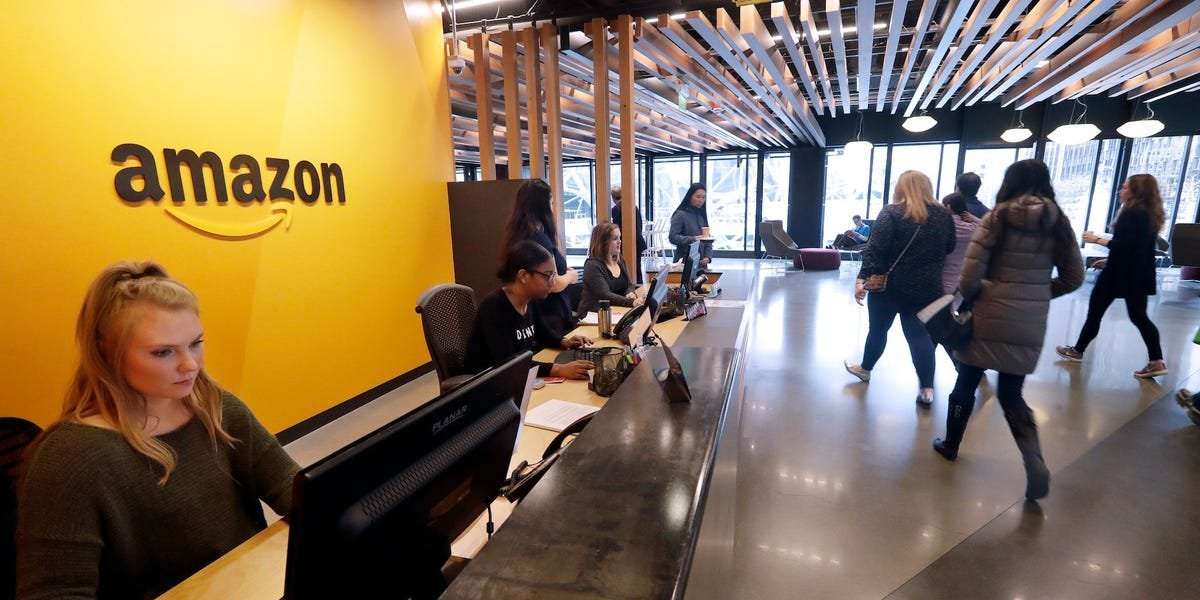Amazon has been meeting with and investing in startups, only to later make products that directly compete with them, according to a new report from The Wall Street Journal.
The Journal spoke with startups who said Amazon made similar hardware and software products after purchasing stakes in the companies. In one example, Amazon invested in a hardware startup Nucleus, only to unveil an Echo device that directly competed with Nucleus' product.
A spokesperson for Amazon told Business Insider that "any legitimate disputes about intellectual property ownership are rightly resolved in the courts."
The report comes as Amazon is facing antitrust scrutiny from Congress and the Federal Trade Commission. CEO Jeff Bezos will testify before the House Judiciary Committee about the company's business practices on Monday.
Visit Business Insider's homepage for more stories.
Amazon has been using the startup investment process to help it make its own competing products, according to a new report from The Wall Street Journal's Dana Mattioli and Cara Lombardo.
The Journal spoke with dozens of startup founders, investors, and advisers, who said Amazon met with or invested in their companies, only to later build its own products that directly competed with the smaller company. The Amazon-made products often went on to crush the competition, the Journal found.
The Journal discovered several examples of Amazon's investments leading to in-house product development. LivingSocial, a deals website, told the Journal that after Amazon took a 30% stake in the company, it began requesting troves of data from the company, hiring away employees, and contacting LivingSocial's clients to offer better deals.
In another example, investors from the Alexa Fund purchased a stake in the startup Nucleus, which made a video communication device for the home. Eight months later, after gaining access to Nucleus' plans and financials, Amazon announced the Echo Show, an Alexa-enabled device with a large video screen. Sales of Nucleus' consumer device quickly declined and the company has since pivoted to selling to the healthcare market, the Journal reports.
Amazon later settled with Nucleus for $5 million but did not admit any wrongdoing, according to the report.
Other companies, like DefinedCrowd, Vocalife, and Ubi — which made a voice-operated speaker similar to the Echo — also told the Journal Amazon had met with them or invested in them, then later seemed to use their technology.
In many instances, the smaller companies said they could no longer compete in the space, and downsized or closed.
"We ended up burning through our cash and ended up having to downsize most of the company," Leor Grebler, who created the voice-operated speaker Ubi, an Echo predecessor, told The Wall Street Journal.
Amazon told Business Insider that it does not use confidential information that companies share when Amazon invests to create competing products.
"For 26 years, we've pioneered many features, products, and even whole new categories. From amazon.com itself to Kindle to Echo to AWS, few companies can claim a track record for innovation that rivals Amazon's," an Amazon spokesperson told Business Insider. "Unfortunately, there will always be self-interested parties who complain rather than build. Any legitimate disputes about intellectual property ownership are rightly resolved in the courts."
The Journal's report comes as Amazon is facing scrutiny about potentially anticompetitive behavior. The House Judiciary Committee is holding an antitrust hearing on Monday at which Amazon CEO Jeff Bezos and other prominent tech executives will testify.
The Federal Trade Commission is also looking into "hundreds" of acquisitions by Amazon and other tech firms to determine whether they gained any unfair advantages by purchasing "nascent competitors." The FTC has also spoken with sellers on Amazon's platform after a Journal investigation from April found that Amazon used data from third-party vendors to launch competing products.

enduringthewaves on July 24th, 2020 at 13:35 UTC »
I work for a small digital marketing firm in NYC & one of our past clients is a long-standing, respected mom and pop plant shop on the upper east side. They’ve been doing NYC Christmas tree delivery for decades & when amazon got into the Christmas tree delivery business, they partnered with said shop. I believe it was about 5 years they worked together until last year they received a letter from a bureaucrat stating they are no longer qualified to legally deliver Christmas trees in NYC as laws have changed. Turns out, amazon lobbied for said law changes. They used a small business who knew the game, learned the optimal business strategy, then shut them out of the business.
GWtech on July 24th, 2020 at 12:42 UTC »
Record Companies used to sign bands on to put them on the shelf so they wouldn't compete with their established bands in the same genre.
Daripuss on July 24th, 2020 at 12:30 UTC »
"The Journal spoke with dozens of startup founders, investors, and advisers, who said Amazon met with or invested in their companies, only to later build its own products that directly competed with the smaller company. The Amazon-made products often went on to crush the competition, the Journal found.
The Journal discovered several examples of Amazon's investments leading to in-house product development. LivingSocial, a deals website, told the Journal that after Amazon took a 30% stake in the company, it began requesting troves of data from the company, hiring away employees, and contacting LivingSocial's clients to offer better deals."
Amazon claims no wrong doing and says let the court rulings decide. One company recurved 5 mil in a cash settlement though Amazon recognized no wrong doing. I'm left wondering how well a ruined start up can represent itself in court compared to Amazon and it's legion of lawyers.